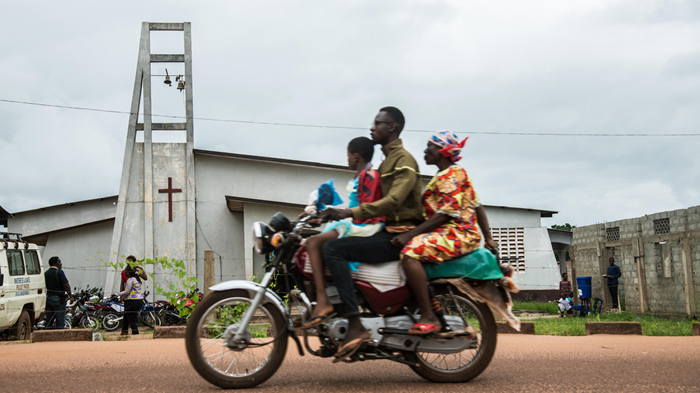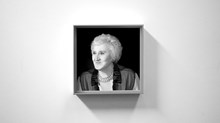
The tight restrictions put in place to stop the latest flare-up of Ebola in the Democratic Republic of the Congo (DRC) go against the typical rhythms of church life, where Christians regularly gather together, partake in sacraments, and lay hands on one another to pray for healing.
Before the World Health Organization declared the six-week-long outbreak largely contained last week, Christian patients and church leaders numbered among the dozens infected by the deadly disease that most violently erupted around West Africa between 2013 and 2016, killing more than 11,000 people.
Two Ebola patients died last month after fleeing a hospital isolation ward so they could be taken to a prayer meeting, where they exposed up to 50 others. Hospital efforts to contain the violent ailment were not enough to prevent two infected patients from being swept out of the hospital to pray.
“The escape was organized by the families, with six motorcycles as the patients were very ill and couldn’t walk,” said Dr. Jean-Clement Carbol, an emergency medical coordinator with Doctors Without Borders, according to Reuters. “They were taken to a prayer room with 50 people to pray. They were found at two in the morning, one of them dead and one was dying. So that’s 50–60 contacts right there.”
(Another Doctors Without Borders coordinator, Henry Gray, said the patients left of their own accord, despite pleas from hospital staff.)
A brutal virus with a mortality rate around 50 percent (and sometimes much higher, depending on the strain), Ebola was first recorded in the DRC, where nine outbreaks have occurred over the last 50 years. The current epidemic, which began in early May, has resulted in at least 38 confirmed cases, 22 more probable cases, and at least 28 dead so far.
At the center of the outbreak along the Congo River, schools closed, an Oxfam team launched a massive public information campaign, and a wave of hundreds of experimental vaccinations is underway. Mission Aviation Fellowship (MAF) in western DRC flew in medical personnel and supplies, partnering with the government and international health organizations scrambling to contain the disease.
At the beginning of June, Catholic churches in Congo suspended sacraments such as confirmation and baptism as well as activities such as anointing the sick, passing the peace, and other physical contact at church.
But not all communities are as willing to cede to the recommendations and, like the two Ebola patients who escaped to pray, will flee health professionals to seek out prophets and prayer warriors.
“Some sick people believe that the Ebola epidemic comes from sorcery—they refuse to be treated and prefer to pray,” said Julie Lobali, a nurse in a hospital in Mbandaka, the city where the two patients died, AFP reported.
The spiritualizing of disease has led people to witch doctors and other healers. The modern church in Africa is sometimes seen as an extension of that tradition. As the promise of miraculous healing mixes with skepticism about the dangers and necessity for caution around deadly diseases, some Christians turn to faith-based treatment rather than medical care.
An evangelical pastor also passed away last month after praying with someone with Ebola who came to him for assistance. A Catholic priest infected by the disease has recovered and was able to recently return to his parish in the remote community of Itipo.
“Some people don't believe in the Ebola virus or in the medication provided, others are afraid of it,” said Jose Barahona, Oxfam’s DRC country director, according to Ekklesia.
“Cases of people leaving hospitals and refusing care have been reported, which could have dramatic consequences,” Barahona said. “There are also some traditional practices concerning the handling and burial of dead bodies that can increase the risk of transmission after death.”
Some self-proclaimed prophets have been accused of directing people suffering from serious illnesses to avoid hospitals or stop taking medications and to seek out healing from God.
Such was the case in 2011 when at least three people with HIV died when their pastors instructed them to halt antiretroviral drugs so that the “power of prayer” could cure them.
T. B. Joshua, a Nigerian megachurch pastor of The Synagogue, Church of All Nations (SCOAN)—which boasts followers and church hubs across multiple continents and shepherds tens of thousands of weekly worshipers—was one of the chief suspects in luring people away from medicine with promises of miracles.
However, when asked by the BBC about claims its pastors could cure deadly diseases, SCOAN said, “We don’t ask people to stop taking medication. Doctors treat; God heals.”
During the largest-ever Ebola epidemic a few years ago, health officials went straight to Joshua to ask that he explicitly discourage those suffering from the disease, at least outside of Nigeria, to come to him for healing. The minister agreed but then sent thousands of bottles of “anointing water” abroad, saying it could heal Ebola.
“Once the disease is spiritualized, its solution can only come from the man or woman of God with the power to deal effectively with evil,” J. Kwabena Asamoah-Gyadu, a professor of African Christianity in Ghana, told CT at the time.
While faith healing is practiced in the West, it is particularly pervasive in Africa. Pastors there sometimes butt heads with health professionals with claims of healing through the laying on of hands, which can diminish the importance of seeking medical care.
In Tanzania, the Ministry of Health and Social Welfare had to warn AIDS patients against quitting doctor-prescribed treatments and turning exclusively to herbal remedies like the “miracle cure” of popular Lutheran pastor, Ambilikile Mwasapila.
Despite official cautions, and even when contradictory evidence arises—as when Mwasapila’s son died from a suspected case of malaria and when four Ghanaians were killed in a stampede for Joshua’s “anointing water”—the search for miracles at the expense of medicine is still prominent.
“We have to convince villagers that the disease is not a curse,” said Bavon N’Sa Mputu, an official in Bikoro, the town where the current Ebola outbreak is thought to have begun, according to an AFP report.
Mputu further echoed the call of government and health officials for churches to play a part in discouraging superstition around disease and encouraging proper medical care.

Support Our Work
Subscribe to CT for less than $4.25/month

















